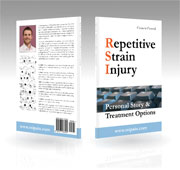What is RSI?
Definition
RSI is not a clearly defined medical term. Repetitive strain injury is an umbrella term for a variety of pain in muscles, tendons and nerves. It primarily consists of micro-injuries of forearm tissue and includes diseases such as compression syndromes (nerve and blood vessels), tendinitis, tenosynovitis and myofascial trigger points. However, an accurate diagnosis is difficult, because sufferers are often affected by more than one disease. On the other hand those micro-injuries cannot be detected with imaging techniques such as X-rays or MRI scans. In addition, the individual problems are often not very pronounced, but jointly cause the pain. In addition, long-term pain alters nerve cells so that after some time they already send out pain signals at low stresses and strains. If you visit a doctor after some time, you might still feel the pain, even if you had quit the repetitive movement which triggered the pain in the first place.
Causes
RSI is usually caused by repetitive movements performed over a longer period of time. Affected are office workers and PC/video game players (repetitive finger movements), assembly line workers (repetitive hand movements), cashiers (moving thousands of goods in the same direction every day), musicians, sign-language interpreters (up to 5600 movements per hour) etc. This list could go on and on, because in almost every profession there are monotonous tasks prevalent. The diseases mentioned above are not the actual causes, they are only a result of an unfavorable working posture and thousands of repeated movements.
Apart from purely physical reasons, there might also be psychological reasons for the pain (see causes).
(Incorrect) Synonyms
Apart from "repetitive strain injury" there are various other terms used to describe those types of injuries: repetitive stress injury, CTD (cumulative trauma disorder) or OOS (occupational overuse syndrome), mouse arm, tennis and golfer's elbow, tendinitis, carpal tunnel syndrome. Mouse arm for example is a little misleading, because it suggests that the arm pain is solely caused by the mouse use. The keyboard plays an equally large part, if not even significantly more. As you can read in my injury history, I was affected on both arms, although I operated the mouse just with my right hand.
Tennis and golfer's elbow are also sometimes used as a synonym for RSI, but really are just labels for a local irritation or inflammation of the elbow. Computer work can also cause a tennis elbow, but the tendon at the elbow is then usually just one of several pain spots. The relatively simple stretch for treating tennis and golfer's elbows is included in the far more extensive "RSI package". If you regularly play tennis, golf or a similar type of sport or perform technical work with your hands, respond to this special test and just rarely use a PC, then just focus on the corresponding stretching exercises.
Prevalence
RSI definitely is not a small issue. The "Occupational Safety and Health Administration" (OSHA) (which is an agency of the United States Department of Labor) already stated in 1996: "One in every three workers' compensation dollars pays for RSIs. In all, insurers awarded an estimated 2.73 million workers' compensation claims for RSIs in 1993, costing employers more than $20 billion. Indirect costs to employers are estimated to be five times that amount -- $100 billion. One major insurance company estimated the individual cost per claim to be $8,000, or double the average claim for other injuries or illnesses."
A representative survey of 1,002 office workers in North Rhine-Westphalia (German state) found out in the year 2000 that 62% of respondents complained of pain in the neck-shoulder area and 24% had muscular pain in the arm region. All respondents worked at least three hours a day on the computer.
Type of pain
Sufferers mostly complain about various pains in varying strength:
- Stabbing pain
- Diffuse pain
- Numbness
- Sensory disturbances
- Tingling
- Power loss
- Coldness
- Swelling
Place of pain
RSI almost always manifests itself at several points on the upper body, in particular:
- Hands
- Wrists
- Forearms
- Elbows
- Shoulders
- Neck
- Back
Further general information can be found in these recommended books. On this website I focus on practice-proven tips for prevention and treatment of RSI, less with the theoretical backgrounds.
